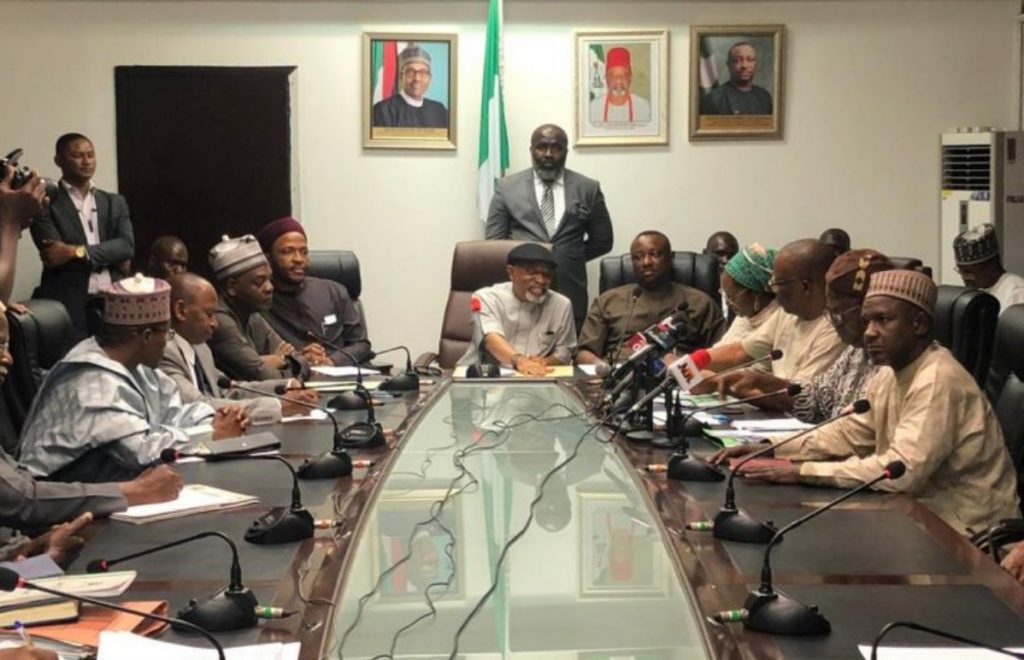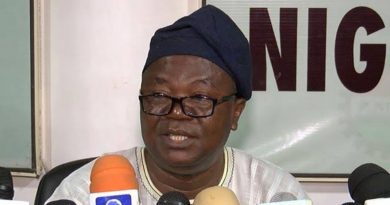Nigerian University students in limbo as ASUU, FG foot-drag over strike
GRACE EDEMA (of The Punch) writes on the face-off between the Federal Government and the Academic Staff Union of Universities (ASUU), which has led to a strike of about seven months by lecturers of the nation’s ivory towers.
Aside from passing the Unified Tertiary Matriculation Examination and the post-UTME, one of the fears of Nigerian admission seekers is the unknown number of years they may spend in the public tertiary institutions when and if admitted.
When students are unable to finish their programmes at the specified time due to one industrial action or the other, they get weary as their hopes are dashed and the future looks bleak.

In Nigeria, studies have shown that if a student does not have an extra year, it is certain that a strike action will elongate his stay on campus.
Over time, several unions on Nigerian campuses have always employed the use of industrial action to drive home their point with the Federal Government, which they claim has a penchant for dishonouring agreements.
Recently, the Federal Government called on tertiary institutions of learning to resume on October 12, 2020, after the long break necessitated by the COVID-19 lockdown, which began on March 20, 2020.
The call, however, fell on deaf ears as unions in the institutions, including the Academics Staff Union of University, Senior Staff Association of Nigerian Universities, and the Non-Academic Staff Union across the country are all on strike.
ALSO READ: Why we haven’t called off strike – ASUU
ASUU, which is the main union, whose industrial actions usually have more impact and effect on the academic system, started with a warning strike on March 9, 2020.
Various reports had it that ASUU made efforts to seek government’s interventions on the five major issues they presented to the Federal Government – renegotiation, earned academic allowances, visitation panels to the universities, revitalisation of infrastructure and proliferation of universities.
In addition, the implementation of the Integrated Payroll and Personnel Information System has now become a major concern in all the tertiary institutions across the country. Many of the workers complain about irregularities in salary payment through the IPPIS, while some others describe it as a scam.
Interestingly, ASUU has developed an alternative to the IPPIS called the University Transparency Accountability Solution, which has been presented to the government.
The National President, ASUU, Prof. Biodun Ogunyemi, in an interview with The PUNCH, said members of the union had no choice but to press home their point by going on strike.
Indeed, ASUU may have good reasons for going on strike, the welfare of its members and lack of infrastructure in the universities are genuine demands, but embarking on an industrial action always has adverse effects on the education system.
Ogunyemi told our correspondent that he once visited his child in the hostel of a federal university and he couldn’t breathe for 15 minutes after he left there.
“The hostel was in a deplorable shape; I wonder how those children are surviving in that hostel,” he said.
There have been reports of universities whose power supply has been completely cut off for months and depend on generators, overcrowding in lecture rooms and many other infrastructural decay on campuses across Nigeria; these are some of the issues ASUU wants the Federal Government to sort out.
Ogunyemi also complained that lecturers could not engage in e-learning during the lockdown due to lack of infrastructure.
History of ASUU strikes
Strike action is not peculiar to ASUU alone. It has always been an instrument, which dissatisfied lecturers/workers use to make the government listen to them and honour agreements.
For instance, between October and November 2017, colleges in Ontario, Canada, had the longest strike in the 50-year history of the country.
ALSO READ: Demands by ASUU are not reasonable – Ministry of Education Insist
Likewise, GEO, the union representing over 2,000 graduate student instructors and graduate staff assistants at the University of Michigan’s three campuses, went on strike on September 8, 2020, with a list of demands, including the right to work remotely and increasing COVID-19 testing.
In 1988, ASUU organised a national strike to obtain fair wages and university autonomy. As a result, the union was proscribed on August 7, 1988, and all its property seized. It was allowed to resume in 1990, but after another strike, it was again banned on August 23, 1992.
However, an agreement was reached on September 3, 1992, in which several of the union’s demands, including the right of workers to collective bargaining, were met. ASUU organised further strikes in 1994 and 1996, protesting against the dismissal of its members by the General Sani Abacha military junta.
A study of activities of unions in higher institutions reveals that industrial actions have been incessant in the Nigerian educational system.
Reasons for strikes
Asides university lecturers coming up with varying demands, overtime, it has been discovered that the government does not honour some of the agreements even after promising to do so or signing memoranda of action with the lecturers and other unions.
Ogunyemi corroborated this when he said that ASUU had signed several memoranda with the Federal Government without them being implemented.
He said, “The government made some proposals as usual but our members are tired of signing memorandum upon memorandum. What you do in a situation like this is to say well, one, two, three and four will take action immediately; give us one week and you will see action; that is how to address problems, not that we have signed three memoranda on the same issue and you keep on shifting the goal post when it comes to implementation.
“Last year February, after we signed the memorandum of action with the government, it went to sleep until we said we were going on strike a year after; nobody was talking to us about what they needed to do, and nobody had done anything they ought to have done; and as we speak, it is as if the government just sign for the sake of signing.
“For us, the difference between a MoA and a MoU is that in the former, there will be timelines attached to all the actions specified; if they are going to set up a visitation panel, yes it will happen in two days or in one month; they are going to pay this, it will happen on so date, and so on; that is when action is attached to time; but this nebulous arrangement that they will agree with you and say they will look into it at the appropriate time is all bureaucratic language. It is not acceptable to our members that; we have been proliferating memoranda upon memoranda; our members are tired of it.”
Effects of strike on the university system
Two wrongs do not make a right and when two elephants fight, the grass suffers. The ongoing faceoff between the Federal Government and ASUU is having negative effects on the students, who are just idling away.
Active and expectant students, who are kept at home, can take up vices, because an idle hand is the devil’s workshop. It has also been observed that after long strike actions, some female students resume to school with protruded tummies, while others who do not want to bear the stress or shame of getting pregnant outside wedlock may procure abortion.
Resources are also frittered away from the country by students, who go to neighbouring countries, where the educational system is more stable and conducive.
A medical student at the Lagos University Teaching Hospital, Idi-Araba, simply identified as Sarah, bemoaned the frequency of strikes in the university system and called on the government to intervene.
She stated, “It’s a problem that needs to be rectified soonest; the core objectives of the union have long been deviated from; the idea was to prevent random strikes and unify the academic calendar, while meeting the basic needs of universities’ staff.
“But that is not the case here. The frequency of strikes is not helping the Nigerian students and something needs to be done. The nature of this strike is frustrating the students.
“A friend of mine, who is studying the same course outside the country, is already pursuing his Masters’ degree, but here in Nigeria, the reverse is the case. For every course you want to take in the university, you’ll have to know the amount of years you’ll be spending and multiply that by two. It’s so impossible for one to do a four-year course in Nigerian universities within that period. It’s actually going to be more than that, which is so uncalled for.”
A student of the Obafemi Awolowo University, Ile-Ife, Kunle Adeleke, said that the strike had stagnated students.
“The strike has caused stagnation in the learning of students. They are wasting our time, something one should finish within two months, you find yourself finishing it in one year because of strike.
“Students, who are supposed to be in school, will because of idleness involve themselves in crimes like Internet fraud, robbery, drugs etc, and some become victims of kidnapping and molestation. Rape has actually been rampant during this time.
“It has reduced my interest in learning. I now find it hard to take my books and read. There are no lecture notes to read and no assignments.
While enumerating the implications of ASUU’s strike on the government, Director of Press, Federal Ministry of Education, Mr Ben Goong, said, “The Federal Government has lost N1.2tn to ASUU strikes. Children now graduate at 30; there are no foreign students coming into Nigeria anymore, because they don’t know when they will graduate.
“Nigerians are running to countries like Benin to study. Most of our graduates can’t vie for jobs here because the age limit is 27, while they are graduating at 30. ASUU members have collected salaries for five years staying at home.”
Our correspondent sought ASUU’s take on the negative effects of strike on the university system.
The University of Lagos ASUU Chairman, Dr Dele Ashiru, said, “Don’t you think that strike actions also have negative impacts on lecturers and their families? Unlike the kleptocratic ruling elite, lecturers also have children in the universities. However, there is no gain without pain. The struggle of ASUU is to get the government to be alive to its responsibility of educating its citizens by providing critical infrastructure and motivation of lecturers in terms of improved salaries and emoluments, expansion and equipment of classrooms and laboratories, and well equipped libraries in order to make university education in Nigeria globally competitive.”
Some observers have said that the plight of public university students in the country is worsened by the fact that children of policy makers don’t attend the schools.
A parent, Mrs EriOluwa who has a daughter in the University of Ibadan said, “My daughter is in her 300 level and she is 27years old because she didn’t gain admission early. I have been thinking of when she will finish, serve, get a job, get a husband I’m just worried about everything. They are delaying the young lady unnecessarily. Then I’m a retiree, I do not plan to keep paying school fee for this long”
The Way out
Faculty member, Rome Business School, Dr Babatunde Asenuga Asenuga said, “The government needs to have a roundtable discussion with the union on the strategic workable solution that will be embraced by all stakeholders so that students can graduate as at when due.
The agreement signed by the government should be implemented vis-a-vis the introduction of a better system by ASUU, which gave birth to the creation of UTAS.”
On the other hand, Ashiru insisted that strike was always the last option. “How else do you persuade an unwilling group of predators? If there are other options, our union is open to suggestions. What our experience confirms is that that is the only language that the Nigerian government understands,” he maintained.
Adeleke also said, “The government should come to a consensus with ASUU. Even if they won’t be given all they asked for, the government should give them part and fix a date for the fulfilment of the other requests.
“ASUU should consider Nigerian students and come to an agreement with the government. I believe the government can attend to their requests, just as everyone is fighting for their own pocket without considering the others.”
The PUNCH
For Advert Placement, Sponsorship, support, Article submission, suggestion, etc, Contact us: info@theabusites.com, +2349015751816 (WhatsApp)





![Names of 398 passengers on the ill-fated Abuja-Kaduna train [FULL LIST] 6 Names of 398 passengers on the ill-fated Abuja-Kaduna train [FULL LIST] 5](https://www.theabusites.com/wp-content/uploads/2022/03/Abuja-Kaduna-train-390x205.jpg)


